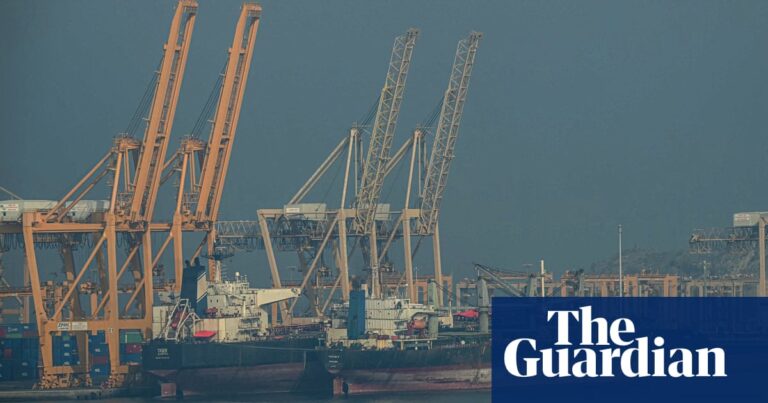Oil prices have dropped sharply after Israel confirmed it had agreed to a ceasefire with Iran, brokered by the US, easing fears of a stagflationary slump in the world economy.
Donald Trump wrote on the Truth Social platform on Tuesday morning: “It has been fully agreed by and between Israel and Iran that there will be a Complete and Total CEASEFIRE.”
Brent crude, the global benchmark, initially fell for a second day, down more than 5% to $67.65 (£49.83) a barrel, after tumbling by 7% on Monday, returning to levels last seen on 11 June, the day before Israel launched a series of strikes against Iran’s nuclear and military sites.
Israel said in a statement on Tuesday morning: “In light of achieving the objectives of the operation, and in full coordination with President Trump, Israel has agreed to the president’s proposal for a bilateral ceasefire.”
However, oil prices traded only 2.4% lower at $67.76 a barrel later on Tuesday, the lowest since 12 June, as doubts emerged whether the ceasefire was holding. Israel’s military said it had detected another Iranian barrage of missiles hours after the start of the ceasefire.
Financial markets have been lifted by news of the ceasefire. In London, the FTSE 100 edged 0.3% higher. In Asia, Japan’s Nikkei rose by 1.1% and Hong Kong’s Hang Seng gained 2.1%.
Airline and travel stocks rose on news of the ceasefire, and shares in Air France KLM, British Airways owner IAG, Hungary’s Wizz Air and Germany’s Lufthansa were up between 5% and 8% in early trading. Europe’s largest travel operator, Tui, jumped by 8%, while Intercontinental Hotels rose by 3.5% and French hospitality company Accor was up by 6%.
Airlines are continuing to halt some flights to the Middle East, due to safety concerns, despite the ceasefire news. BA has suspended all flights to Doha up to and including 25 June, and the budget carrier Wizz Air has cancelled flights to and from the United Arab Emirates until 30 June.
The UK travel company Saga reported that its ocean and river cruises had a strong start to the year, and said it had not been affected by the Middle East conflict. It does not offer cruises to the region and only sells holidays to Jordan and Egypt.
Oil stocks took a hit, with Shell losing 3.5% and BP down by 4.8% in London.
On Monday, Iranian action against al-Udeid airbase in Qatar raised hopes that the conflict would not immediately disrupt oil supplies from the region. No casualties were reported after the strike, which the US Department of Defense described as “largely symbolic” after the US bombed three nuclear sites in Iran on Saturday.
Matt Britzman, a senior equity analyst at Hargreaves Lansdown, said: “Risk assets are back on the menu after President Trump announced a ceasefire has been brokered between Israel and Iran. The details may still be a little up in the air, but global stock markets are pushing higher as a result.
Sign up to Business Today
Get set for the working day – we’ll point you to all the business news and analysis you need every morning
Privacy Notice: Newsletters may contain info about charities, online ads, and content funded by outside parties. For more information see our Privacy Policy. We use Google reCaptcha to protect our website and the Google Privacy Policy and Terms of Service apply.
after newsletter promotion
“Iran’s telegraphed retaliation against the US had already been taken as a sign that de-escalation was the most likely path forward, which had helped lift US stocks, and the rally has extended. Traders have arguably been betting on this outcome for a while. Despite the turmoil over the weekend, oil prices were quick to shift into reverse – an early signal that markets were betting on de-escalation sooner rather than later. Iran’s response notably refrained from targeting any oil facilities or the important strait of Hormuz.”
He added: “Lower oil prices are a key component to keep inflation down and something the US Federal Reserve will have one eye on when thinking about whether to cut interest rates at the next meeting in July.”
On Monday, US stocks also rose slightly, with the benchmark S&P 500 up nearly 1% and the Dow Jones industrial average rising 0.9% in New York.
Chris Beauchamp, chief market analyst at the online platform IG, said: “There are still hurdles to navigate, most notably the 8 July deadline for trade deals, but for the moment the market thinks that there will be some kind of fresh extension.
“Slumping oil prices have negated some inflation fears for now, and with two Fed governors calling for rate cuts the overall tone continues to be supportive for risk assets.”
While the Iranian parliament voted to close the strait of Hormuz – through which more than a fifth of the world’s oil supply, 20m barrels, and much of its liquefied gas passes each day – it has so far remained open.
